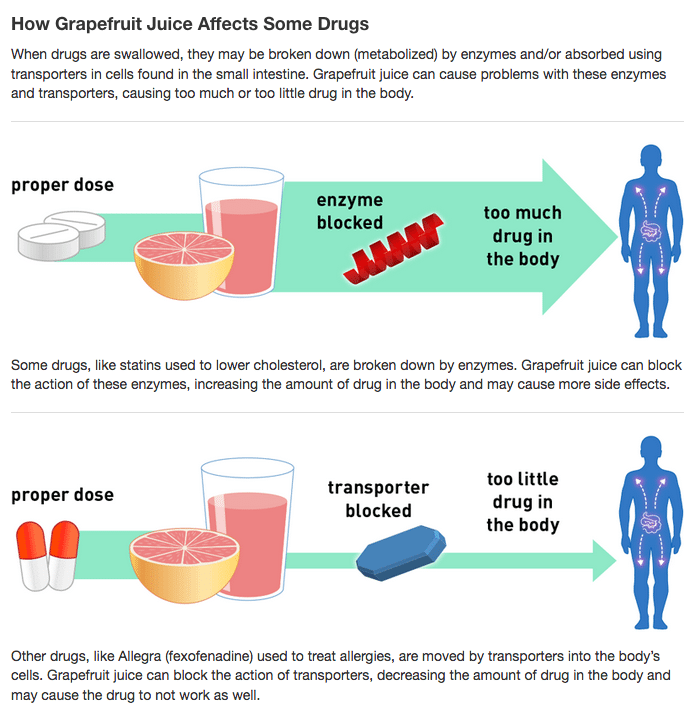There's no doubt that grapefruit is good for you. Grapefruit contains lots of Vitamin C and Vitamin A, plus high amounts of fiber, potassium, lycopene, and choline. Eating a grapefruit may have other health benefits, too, like helping with weight loss, combating heart disease, and strengthening your immune system. Basically, it's a super fruit.
However, if you take certain medications, you need to be careful not to mix your medicine with grapefruit because it may cause drug interactions that interfere with how the drug works.

When you take drugs, they are metabolized by your digestive system. An enzyme called CYP3A4 breaks down the drug which means that most of it goes through your digestive system instead of your blood stream. But grapefruit can block that enzyme, which allows too much of the drug to enter your bloodstream instead of your body breaking it down normally. That means you may experience increased side effects from the drug if you mix grapefruit and your medicine.
The U.S. Food and Drug Administration lists the following drugs that can be affected by eating grapefruit or drinking the juice.
- Some statin drugs to lower cholesterol, such as Zocor (simvastatin) and Lipitor (atorvastatin).
- Some drugs that treat high blood pressure, such as Procardia and Adalat CC (both nifedipine).
- Some organ-transplant rejection drugs, such as Sandimmune and Neoral (both cyclosporine).
- Some anti-anxiety drugs, such as buspirone.
- Some corticosteroids that treat Crohn's disease or ulcerative colitis, such as Entocort EC and Uceris (both budesonide).
- Some drugs that treat abnormal heart rhythms, such as Pacerone and Nexterone (both amiodarone).
Allergy medicines like Allegra (fexofenadine) can also be affected by grapefruit juice, though in its case, it blocks the drug and makes it less effective. If you drink grapefruit juice or eat fresh grapefruit up to two hours before or after taking your allergy medicine, it may not work as well.
It doesn't matter if it's red grapefruit, pink grapefruit, or white grapefruit, consuming this kind of citrus may cause an adverse effect with your medication.
It's best to carefully read the information that comes with your prescription; it should say if you should not eat or drink grapefruit or other fruit juices at the same time as taking the medication. You should also check labels on any juice you drink to see if it has been blended with grapefruit juice.
Some other citrus fruits like Seville oranges, pomelos, and tangelos may also react with certain drugs. Definitely talk to your doctor or pharmacist about what you should and should not take with your medication, especially if you have concerns about mixing food and prescriptions.





